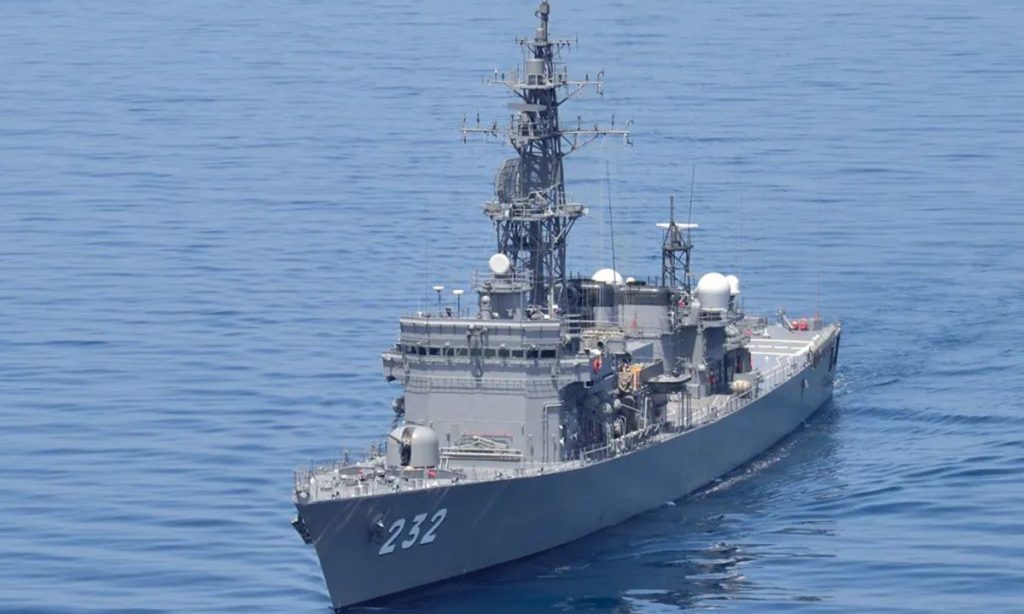Japan's reported plan to export used destroyers to Philippines another example of military collusion: expert

Japan will export used destroyers to the Philippines, Reuters reported, citing Japan's Yomiuri newspaper on Sunday, to strengthen what the report claimed is a deterrence against the so-called "China's maritime expansion." A Chinese expert said that the strengthening of military ties between Japan and the Philippines serves to support the US' attempt to contain and suppress China in its "Indo-Pacific Strategy," meanwhile, both countries have their own ulterior motives.
The export plan involves six Abukuma-class destroyer escorts in service with the Japan Maritime Self-Defense Force for more than three decades, the Japanese newspaper said, citing multiple unnamed government sources.
Japanese defense minister Gen Nakatani and Philippine defense secretary Gilberto Teodoro agreed to the destroyer export when they met in Singapore last month, Yomiuri reported, adding that the Philippine military is set to inspect the destroyers this summer as part of the final preparations. A Japanese defense ministry spokesperson declined to comment on the report, while a Philippine military spokesperson did not respond for comment, Reuters reported.
The Abukuma-class destroyer escort, a relatively small type of destroyer with a 2,000-ton standard displacement, is operated by a crew of about 120 and is armed with anti-submarine and anti-ship missiles, torpedo tubes and guns, according to a website of Japan's Maritime Self-Defense Force, Reuters reported.
This is another case of Japan and the Philippines colluding and coordinating with each other, Zhang Junshe, a Chinese military affairs expert, told the Global Times on Sunday. The strengthening of military ties between Japan and the Philippines serves two purposes: first, to support the US' attempt to contain and suppress China in its "Indo-Pacific Strategy," and second, both countries have their own ulterior motives, Zhang said.
Japan is attempting to alleviate the pressure it faces from China's countermeasures regarding China's Diaoyu Dao by selling weapons and equipment, such as radar, patrol vessels and destroyer escorts to the Philippines, thereby encouraging provocations against China in the South China Sea while also restraining China's development, Zhang said.
Even if the Philippines purchases second-hand destroyer escorts and other equipment from Japan, the inconsistency in systems and communications with other ships currently used by the Philippines will make it difficult to significantly enhance its naval combat capabilities. Moreover, these weapons cannot help the Philippines achieve its illegal territorial expansion goals in the South China Sea, Zhang said.
The Philippines has also purchased second-hand patrol boats and warships from other countries, but due to the diverse origins of these weapon systems, it is challenging for the Philippines to form a coherent system operational capability. Given its inherently weak military strength, relying on outdated weapons purchased from abroad to provoke in the South China Sea is an overestimation of its own capabilities, Zhang said.
Recently, Japan and the Philippines have been frequently collaborating militarily. Japan has not only participated in maritime joint exercises and patrols conducted by the US and the Philippines in the South China Sea, but has also invited the US and the Philippines to conduct joint patrols around Japan, strengthening the bloc led by the US to confront China, the expert noted.
Japan and the Philippines are continuously provoking China in their actions, yet they are using the excuse of curbing so-called "China's expansion." In fact, it is the Philippines that has invited external forces in and, relying on their support, has been continuously infringing and provoking in the South China Sea, undermining peace and stability in the region, said Zhang.
China does not seek trouble, but when it comes to issues concerning national territorial sovereignty, it will never back down and will definitely take targeted countermeasures, Zhang said.
Chen Xiangmiao, director of the World Navy Research Center at the National Institute for South China Sea Studies, told the Global Times on Sunday that Japan's plans to export used destroyers to the Philippines are purely "a political game." Because, for the Philippines' side, training of crew members, dock supplies and logistical support and maintenance are all difficult to keep up with, Chen said.
The facts cannot be changed as it is merely to convey a signal to jointly respond to China, which cannot shake the unwavering determination of China to uphold its territorial sovereignty and maritime rights, Chen said.
Japan's recent military ambitions exposed by its expansion activities raise significant concerns regarding regional stability and international order. The country's focus on maritime expansion is evident not only in the East China Sea but also in the South China Sea and the South Pacific, indicating a broader strategic ambition, according to Chen.
On April 30, responding to Japan-Philippines Summit Meeting, during which the two sides agreed to strengthen bilateral security cooperation and oppose attempts to change the status quo unilaterally in the East and South China Seas, Chinese Foreign Ministry spokesperson Guo Jiakun said that "China has all along believed that exchanges and cooperation between countries should not target any third party or harm their interests." "China's sovereignty and relevant rights in the East and South China Seas were established in the long course of history and are consistent with international law, including the United Nations Convention on the Law of the Sea. China's activities in relevant waters are legitimate, lawful and justified," Guo said.